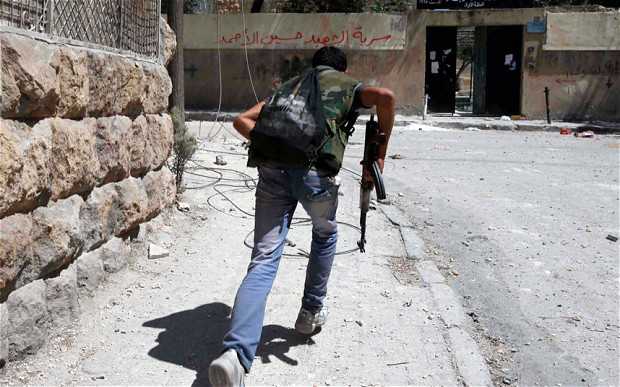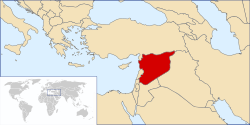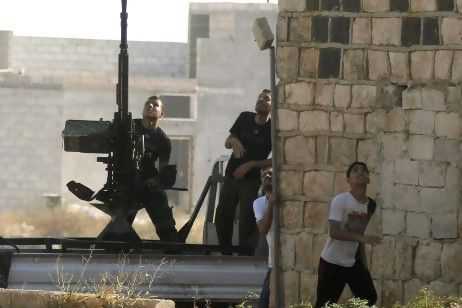An underground network of Syrian opposition activists is receiving training and supplies of vital equipment from a combined American and British effort to forge an effective alternative to the Damascus regime.

By Damien McElroy, Istanbul
Dozens of dissidents have been ferried out of Syria to be vetted for foreign backing. Recipients of the aid are given satellite communications and computers so that they can act as a local “hub” linking local activists and the outside world.
The training takes place in an Istanbul district where handsome apartment blocks line the steep slopes and rooftop terraces boast views over the Golden Horn waterway.
Behind closed doors the distractions of outdoor coffee shops and clothing boutiques gives way to power point displays charting the mayhem sweeping Syria.
“We are not ‘king-making’ in Syria. The UK and the US are moving cautiously to help what has been developing within Syria to improve the capabilities of the opposition,” said a British consultant overseeing the programme. “What’s going to come next? Who is going to control territory across Syria. We want to give civilians the skills to assert leadership.”
Once up and running dissidents can expect help to deal with local shortages and troubleshooting advice from sympathisers.
But the activists also face two days of vetting designed to ensure that the programme does not fall into the trap of promoting sectarian agendas or the rise of al-Qaeda-style fundamentalists.
“Rather than being about promoting political platforms in Syria, it’s about creating a patchwork of people who share common values,” the consultant said.
The schemes are overseen by the US State Department’s Office of Syrian Opposition Support (OSOS) and Foreign Office officials. America has set aside $25 million for political opponents of President Bashar al-Assad while Britain is granting £5 million to the cause of overthrowing the regime.
Mina al-Homsi (a pseudonym) is one of the first graduates of the training.
She now spends her days plotting how to spread seditious messages throughout her homeland through her own network, named Basma.
One of its main activities is to repackage video shot by amateurs into a format that can be used by broadcasters.
In addition to running online television and radio forums, the Basma team have had “tens of thousands” of satirical stickers depicting President Bashar al-Assad as a featherless duck for distribution as agitprop.
“It comes from the emails that his wife Asma sent to him calling him duckie and the cartoon duck is featherless to show that he is an emperor with no clothes,” she said. “People will stick them on walls, on car doors, on dispensers in restaurants and those who have not yet joined the revolution will know that we are everywhere.”
Foreign intervention in civil wars has proven to be a perilous undertaking since the end of the Cold War but in Syria where an invasion has proven unfeasible, diplomats have had to resort to creative thinking.
It was the legacy of non-intervention, however, that provided the spark for the schemes now backing Basma and others.
An initiative, proposed by Foreign Secretary William Hague, to document evidence of crimes committed in the fighting for use in potential International Criminal Court trials, has been transformed into the multinational project to build Syria’s next governing class.
“This has been a generational coming of age,” said the consultant, who spoke on condition of anonymity. “The Foreign Secretary started this as a way to make sure that people who committed crimes in Syria would be held to account. Those of us with experience of the Balkans have taken the lessons of that conflict very much as a formative experience.”
With the entry of American funding for a much wider scheme, the need to avoid the mistakes of wars in Afghanistan and Iraq has also driven the planning.
“It’s also not Iraq or Afghanistan – there are no bundles of cash being dropped on the problem without accountability,” he said.
Jon Wilks, the Foreign Office diplomat who serves as envoy to the Syrian opposition, told the Arabic newspaper al Sharq al Aswat last week that Britain was already working to lay the foundations of democracy in a post-Assad Syria.
He said: “We must train activists on governing locally in villages and cities in Syria for the post-transitional phase.”
Officials are adamant there will be no crossover between the civilian “non-lethal” assistance and the military campaign waged by the rebel fighters.
The scheme has, however, infuriated the exiled opposition body, the Syrian National Council. Its failure to provide a united and coherent front against the regime has led some western officials to brief privately that foreign governments were shifting support beyond the exiled body.
But in a barely furnished office in a tower block near Istanbul airport an SNC official decried the false promises of its allies. “We’ve heard a lot of promises from the very beginning of the SNC but none of those have been fulfilled,” the SNC official said. “This has reflected absolutely negatively on our work. The opposition of Syria wants the world to provide humanitarian aid for the people in need and the Free Syria Army wants intervention to stop planes bombing their positions.
“Instead they go around behind our back undermining our role.”
A Whitehall official said the effort was not about building an alternative to the SNC but a means to enhance the role of those dissidents still within Syria.
Victoria Nuland, the State Department spokesman, confirmed the OSOS programme last week and said its full effect would only be seen when President Assad leaves office.
“There are groups inside and outside Syria beginning to plan for that day-after and beginning to plan for how they might quickly stand up at least that first stage of transition so that we could move on when Assad goes, because he will go.”




